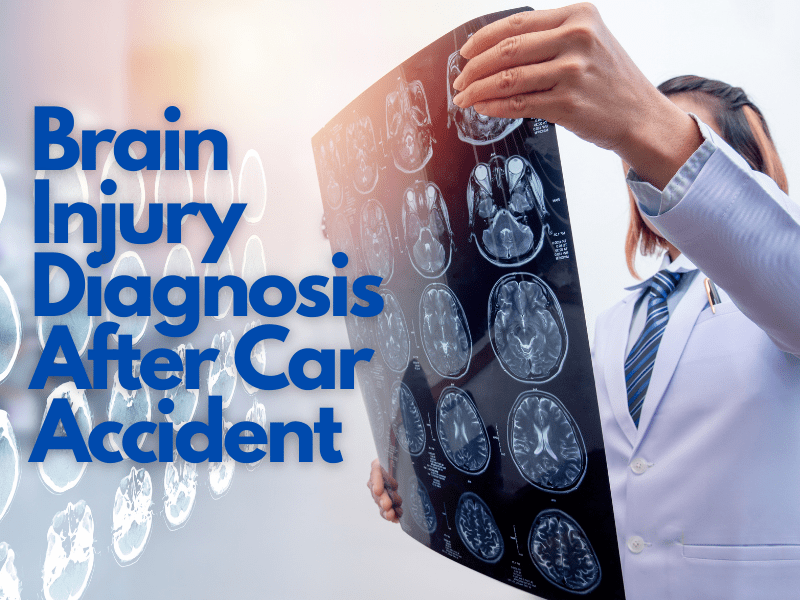Brain Injury Diagnosis After Car Accident in Sacramento, CA

Motor vehicle accidents are one of the most common causes of traumatic brain injuries (TBIs) in the United States. Some TBIs result from direct impact with objects in a crash, such as a steering wheel or the dashboard. But even low-speed collisions can cause a head injury. Getting a prompt traumatic brain injury diagnosis is critical to maximize your recovery and prevent complications after a wreck.
How is a diagnosis made?
When a person experiences a head injury, whether, from a car accident or another type of incident, the first step is to seek medical attention. The doctor will conduct a physical examination and ask about the head injury and any symptoms that the person is experiencing. The doctor may also order imaging tests, such as a CT scan or MRI, to help assess the extent of the injury.
After the initial assessment, the doctor may refer the person to a specialist, such as a neurologist, for further testing and evaluation. The specialist will conduct additional tests to assess brain function and determine the severity of the injury. Based on this information, they will make a diagnosis and develop a treatment plan.
There are four main types of traumatic brain injuries: concussion, contusion, diffuse axonal injury, and skull fracture. Each type has its own set of symptoms that can vary from person to person.
Did you suffer a TBI after a car accident in California? You could be entitled to significant compensation if someone else is responsible for your injury. An experienced brain injury attorney at Demas Law Group can help you seek money for your losses and hold the at-fault party accountable for their actions. Contact us today for a free case review.
Types of Traumatic Brain Injuries
Not all brain injuries are created equal, but all TBIs can have serious consequences. Common types of traumatic brain injury include:
- Concussions: A concussion is caused by blunt-force trauma or a violent shaking of the head. While concussions are considered the mildest type of TBI, they can still leave victims with long-term impairments.
- Contusions: The medical term for a bruise, a contusion occurs when small blood vessels break and begin leaking blood under the skin. Brain contusions can result in a dangerous buildup of pressure in the skull.
- Coup-contrecoup injuries: A coup-contrecoup injury occurs when a jolt to the head causes damage on both sides of the brain, one at the point of impact and the other from the brain striking the opposite side of the skull.
- Diffuse axonal injuries: Also called a shearing injury, a diffuse axonal injury occurs when a violent rotational force tears the axons connecting the two hemispheres of the brain.
- Penetrating injuries: A penetrating brain injury occurs when a foreign object or skull fragment pierces the brain’s soft tissue.
Signs and Symptoms of Brain Injuries After a Car Accident
 The brain controls every part of the body. It governs how you think and how you feel. It also coordinates involuntary functions like your heartbeat, breathing, and body temperature. Any type of brain damage could compromise these vital systems ― and change your life forever.
The brain controls every part of the body. It governs how you think and how you feel. It also coordinates involuntary functions like your heartbeat, breathing, and body temperature. Any type of brain damage could compromise these vital systems ― and change your life forever.
Common traumatic brain injury symptoms include:
- Physical problems – Loss of consciousness, headaches, nausea, vomiting, convulsions, pupil dilation, and secretion of clear fluids from the eyes or nose
- Regulatory issues – Problems with fatigue, sleep disturbances, changes in appetite, headaches, dizziness, and loss of bladder or bowel control
- Cognitive changes – Memory issues, confusion, poor attention span, difficulty understanding abstract concepts and problem-solving, loss of awareness
- Motor function issues – Paralysis, weakness, muscle tension, loss of balance, tremors, trouble swallowing, loss of coordination, and loss of endurance
- Sensory difficulties – Changes in the sense of sight, hearing, taste, smell, or touch, or changes in sensation, vision, and ability to sense body location or movement
- Communication difficulties – Difficulty speaking, forming sentences, understanding speech, reading, writing, or working with numbers
- Psychosocial changes – Difficulty with social interactions, reduced motivation, mood swings, depression, anxiety, and irritability
- Traumatic epilepsy – Ongoing seizures (called traumatic epilepsy) that can last a lifetime after a severe TBI
Recovering from a Traumatic Brain Injury
The types of treatment needed to recover from a TBI depend on the severity of the injury. Many mild TBIs can heal with rest. But car accident victims with catastrophic trauma may require more intensive traumatic brain injury treatment, such as:
- Emergency care: Immediately after a severe TBI, providers will typically focus on preventing or minimizing secondary injuries by maintaining an adequate flow of blood and oxygen to the brain.
- Prescription medications: Doctors may prescribe anti-seizure drugs, sedatives to induce temporary comas, and medicines to reduce the amount of fluid stored in soft tissues.
- Surgery: Surgical intervention may be required to remove blood clots, repair fractured skulls, staunch bleeding in the brain, or relieve intracranial pressure.
- Physical rehabilitation: Physical therapy is often required to help TBI patients re-learn how to balance, walk, and perform daily activities.
- Cognitive rehabilitation: Occupational, speech, and vocational rehabilitation can help survivors improve communication skills, learn coping strategies, and regain occupational skills.
- Psychotherapy: A therapist can help TBI victims cope with depression, anxiety, mood swings, panic disorder, and other mental conditions stemming from the crash.
The financial, physical, and emotional costs of a traumatic brain injury can be sky-high. If your injury is someone else’s fault, talk to a lawyer right away to learn your legal rights.
What to Do After a TBI in Sacramento
If you suffered a traumatic brain injury after a car accident, protect your legal rights by:
- Seeking prompt medical attention to ensure your injuries are properly diagnosed, treated, and added to your medical record
- Following your doctor’s care plan and attending all follow-up appointments
- Recording how the TBI affects your day-to-day life in a daily journal
- Gathering evidence such as photographs, driver information, and witness statements from the accident scene
- Keeping track of medical bills, pay stubs, bank invoices, vehicle repair estimates, and other documentation of accident-related financial losses
- Avoiding discussing the accident on social media or with others
- Contacting a knowledgeable brain injury lawyer as soon as possible
Compensation for Brain Injury Victims in Sacramento
A successful TBI claim can compensate you for the personal and financial costs you suffered due to your injury. Depending on your situation, you may be entitled to compensation for:
- Medical expenses
- Rehabilitation costs
- Incidental expenses, such as costs of travel to and from medical appointments
- Lost wages
- Projected losses in your lifetime earning capacity
- Pain and suffering
- Lost quality of life
- Property damage
Contact a Sacramento Traumatic Brain Injury Lawyer
Did you sustain a TBI after a car accident in Sacramento? If so, it’s time to take action with the help of a trusted attorney. Call or contact Demas Law Group now to discuss the details of your accident claim with us in a free consultation.
